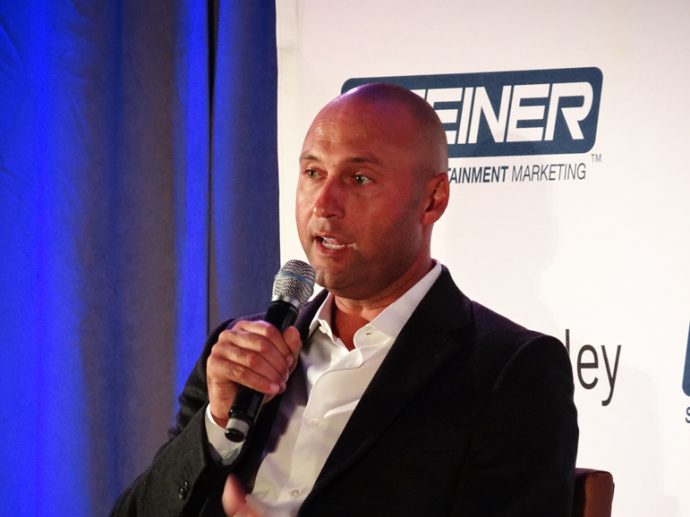Highlights from Derek Jeter’s storied baseball career are often famous enough to be described in quick phrases.
There’s The Flip, the “Mr. November” World Series home run, the home run for his 3,000th hit and the walk-off single that ended his career at Yankee Stadium.
Those highlights, along with a series of others, played on a screen at the Westchester Marriott in Tarrytown recently before Jeter was called to the stage to talk with broadcaster Jeremy Schaap about his career and life since he donned pinstripes for the final time in 2014.
Jeter said he’s still looking for things that quench his “competitive thirst,” which include improving his golf handicap.
But several hundred guests of the Business Council of Westchester’s “Getting in the Game” event came to hear him talk about that other sport, the one that led him to a storied career as New York Yankees shortstop. It has included five World Series titles, 14 All-Star game appearances and the retirement of his No. 2 jersey this spring — not to mention a likely date with Cooperstown.
Schaap, an eight-time Emmy Award-winning broadcaster at ESPN (and son of sportswriter Dick Schaap), asked Jeter which of the World Series titles he was most proud of. Was it the one earned with the all-time great 1998 team, which won a record-setting 114 games in the regular season and swept the Series, or the 2000 team, which squeaked into the playoffs with just 87 wins before getting hot in October and beating the New York Mets in the Subway Series?
Jeter, who announced last month that he and his supermodel wife, Hannah, are expecting their first child, said picking a favorite World Series team would be like asking a parent to pick a favorite child — though he did seem to lean toward one particular team.
“From wire to wire, I think the ’98 team is pretty special,” Jeter said. “Every year there are different things you go through, you’re faced with adversity and you overcome adversity, but ’98 was probably the most special group I’ve been a part of.”
Schaap also asked Jeter, who led the Yankees as team captain for the last 12 of his 20 seasons, about the different kinds of leadership he experienced early in his career, particular that of Paul O’Neill. A right fielder who played with Jeter from ’96 through 2001, O’Neill was a five-time All-Star who was known for his water-cooler smashing temper.
“Paul’s a little crazy,” Jeter said, drawing a laugh from the crowd. “There are different types of leaders. You have vocal leaders, people who lead by example. You want to have multiple leaders on the team… Paul O’Neill was a fiery leader. Tino [Martinez] was the same way.” On the other hand, centerfielder-musician Bernie Williams (October 2015 WAG) led quietly, Jeter added, when he wasn’t lost in his own creative thoughts.
While Schaap said he would be “more than happy to talk old baseball stuff for the whole time,” he noted they were also there to talk about Jeter’s entry into the business world. It was a Business Council event, after all. Jeter said he may be just as busy now as he was as a player, though in different ways.
“I never wanted to wake up and look in the mirror and say, ‘What am I going to do now?’” Jeter said.
He continues to run his Turn 2 Foundation, which seeks to keep young people away from drugs and alcohol and focused on healthy lifestyles. He also has an imprint through Simon & Schuster that publishes adult nonfiction, children’s picture books and fiction aimed at middle-grade students.
But his most high-profile venture is undoubtedly is The Players’ Tribune. The website was created to provide “athletes with a platform to connect directly with their fans in their own words,” according to a description on the site.
Throughout his career, Jeter was careful with his comments to journalists. So it was a surprise to some that he jumped from the diamond into the media world.
“A lot of time athletes get a bad rap, because people say they don’t want to speak up, they don’t want to share their thoughts. I heard it about myself all the time,” Jeter said. “My job was to limit distractions for my team and I knew what some members of the media were looking for. They’re looking for headlines. And a lot of athletes do want to speak up, they have interests, things that are on their mind. So we wanted to provide them with that platform and the tools to do it an effective way.”
The Players’ Tribune has quickly become a major force in sports journalism. It publishes all first-person accounts written by athletes, from megastars like Jeter to lesser-known NFL journeymen.
It’s not just a site for players to promote their pet projects. The site has broken news and given players a voice on social issues. The Players’ Tribune had possibly the biggest sports scoop of 2016 — the decision of NBA MVP Kevin Durant to sign with the Golden State Warriors in July, which Durant announced himself in an article on the site. It has recruited more than 1,000 athlete-contributors.
While Jeter acknowledged journalists could view the site as a threat, he said he sees The Players’ Tribune as a complement to the traditional sports beat reporting.
“It’s been great, because when athletes are speaking to a trusted source, it’s amazing what stories come out,” Jeter said.
What’s next for him? Since retiring, he’s been open about wanting to own a baseball team. On this particular occasion, however, he was tight-lipped on which big league franchise in particular appealed to him.
“Unfortunately you don’t pick and choose where you own a team,” he said. “A lot of these are generational, so they don’t come up all the time. But that’s the next move.”
For more, visit theplayerstribune.com.




